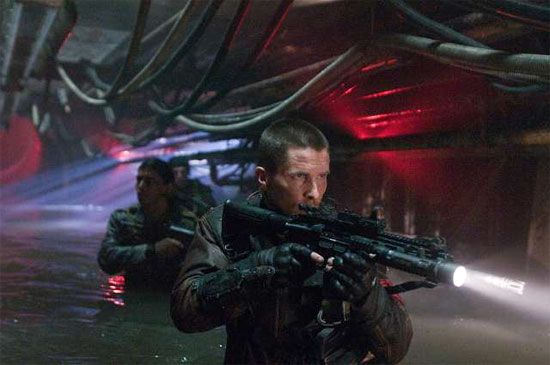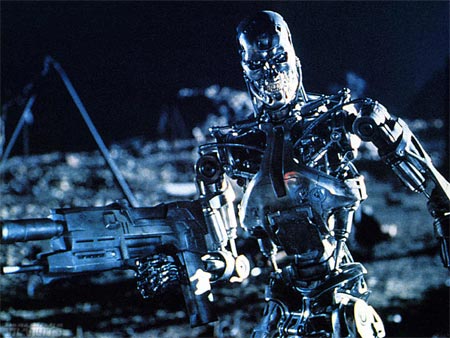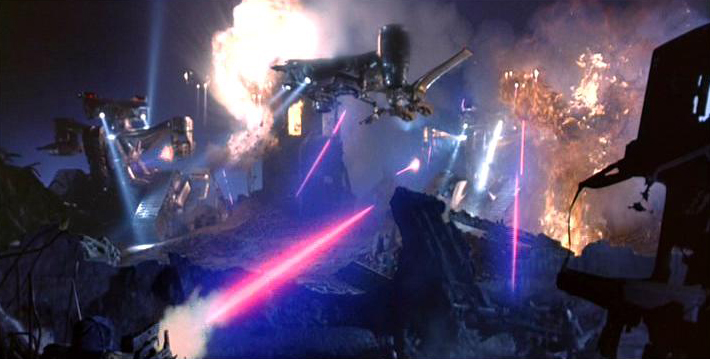The best parts in the original Terminator were those few elusive glimpses of the post-judgment day future: mechanised drones swooping over mountains of bones and debris in a permanent night; gleaming red terminator eyes piercing through the haze. These salient images hung like a threat over the first instalment of the franchise. It was this contrast between an abstract nightmare and the gritty realism of the film that gave it its edge — the true horror always lying behind Arnie’s wrap-around 1980s shades.
For reasons budgetary or otherwise, this dystopian future had remained just a glimpse until Terminator Salvation. It’s a shame, then, that McG and crew have decided that now is the time to set the Terminator storyline in a vaguely plausible world — he is merely the latest in a string of directors charged with reviving a franchise who has taken this route. Batman Begins was a very necessary step in refreshing the Batman films, a dose of reality to offset the expressionistic cartoon approach Tim Burton perfected and Schumacher made stale; the _Bourne_ification of Bond has made our favourite spy less kitsch, but has also robbed 007 of some of his charm.
But the ‘cast a good actor in the lead and use Steadicam’ approach doesn’t work for everyone. Star Trek seems to have successfully reinvigorated the series without loosing an ounce of childish wonder. Spiderman, despite the so-so third instalment has done just fine with the bright 60s comic aesthetic.
Salvation follows the early days of John Connor’s resistance as he struggles to unite the earth’s remaining humans and make sense of his mother’s prophecies. A mysterious stranger (who Kyle Reese didn’t bother to warn his mother about) threatens to complicate Connor’s destiny. The film is shot like a straight-up, no frills war movie, which in many ways suits the its series of skirmishes. McG, to his credit, has taken some cues from Children of Men‘s brilliant action sequences, using excruciatingly long takes with the camera peering tentatively over the actor’s shoulder. Unfortunately, this seemingly objective gaze is sabotaged by cartoonish coincidences and tame PG-13 violence.
The bigger problem is that the ‘plausibility’ that the film aspires to is bought at the expense of imagination and aesthetics. The future looks suspiciously like what parts of California already do in this time of recession. More The Grapes of Wrath than Mad Max, this is far from the dark hell that spawned the robots of the original films.

The best robots are naturally borrowed from the originals: those red eyes, the hovering drones, the T-800. All the new machines look over-designed and inefficient, much as those of Transformers did. What made the original films so scary was that the enemy was characterless, designed by cold, blunt logic, not driven by ergonomics. But Salvation even goes so far as to give a human face to Sky Net, in the form of Helena Bonham Carter. Her avatar divulges Sky Net’s plans for world domination, toying with our heroes like an arrogant Bond villain instead of killing them quickly, like a computer program should. The creepiest enemy by far is the CGI Arnold look-a-like, who by way of the limitations of CGI, does a much better job of acting coldblooded than Arnold himself has since taking public office. Unfortunately, there is not enough space between the countless action sequences to set up this little confrontation.
Part of the problem with the drama is that there is no sense of scale. The so called "valley of the shadow of death" looks more like a suburban retaining pond when it should look like the entrance to Mordor; Skynet Central looks like a corporate car park when it should look like the tower in Metropolis; The scene of the final battle (which by law must take place in a factory) looks like a Volkswagen plant; even the nuclear explosions, of which there are a couple, look weak and manageable.
James Cameron, in contrast, knew how to endow events and locations with a larger than life scale and mythological importance. The nuclear explosion in T2 was a destroyer of worlds not some tactical, battlefield-strength cherry bomb. The foundry at the end of T2 had an aura about it, like hallowed ground — you knew that it all ended there. Even the liquid nitrogen truck was imposing like the truck in the video for Metallica’s ‘Enter Sandman’. Salvation makes the future seem real, but there’s not a memorable character, shot, or line to populate this wasteland.
The biggest disappointment is Christian Bale, whose tantrum of a performance is just a continuation of his hilarious YouTube rant at the director of photography. As he slips in and out of the Batman voice, it makes one seriously reconsider why he is filed under ‘good actor’. Maybe we should blame the DP for these histrionics, but really, when you have to deliver lines like "The devil’s hands have been busy" with a straight face, you can’t blame the man. All he can do without any character development is shout some lines for the trailers and pretend that there’s more where that came from.
Terminator Salvation is not an unforgivable film; it’s merely a decent sci-fi/action flick in a franchise which once set the bar for this conjoined genre. It does succeed in not fucking up the mythology — the worst case scenario would be a film that drove things so ridiculously off track it prevented future good films from picking up the baton. The basic story is clever, elegant and in the spirit of the originals. The tension is genuine and is maintained throughout as the film barrels toward a climax. Also, for the first time since the first film we have an entry into the franchise that takes itself entirely seriously — instead of relying on Schwarzenegger’s celebrity or ironic in-jokes to entertain.

While it’s surprising to see the man who brought us Charlie’s Angels: Full Throttle taking anything seriously, unfortunately in his humourless, fanboy quest to create the future McG seems to have lost some of the fun along with the campy ’80s laser effects. Perhaps the future was too much to live up to. Maybe it was always impossible to extend the nightmarish intensity of those visions of the future to feature length. Maybe Hollywood’s monomaniacal drive to render all our most fantastical dreams and nightmares in realistic CGI has robbed filmmakers of their imagination, or maybe it’s the film-going public who have lost theirs. Either way, the future presented to us in Salvation is so believable it’s fucking boring.


